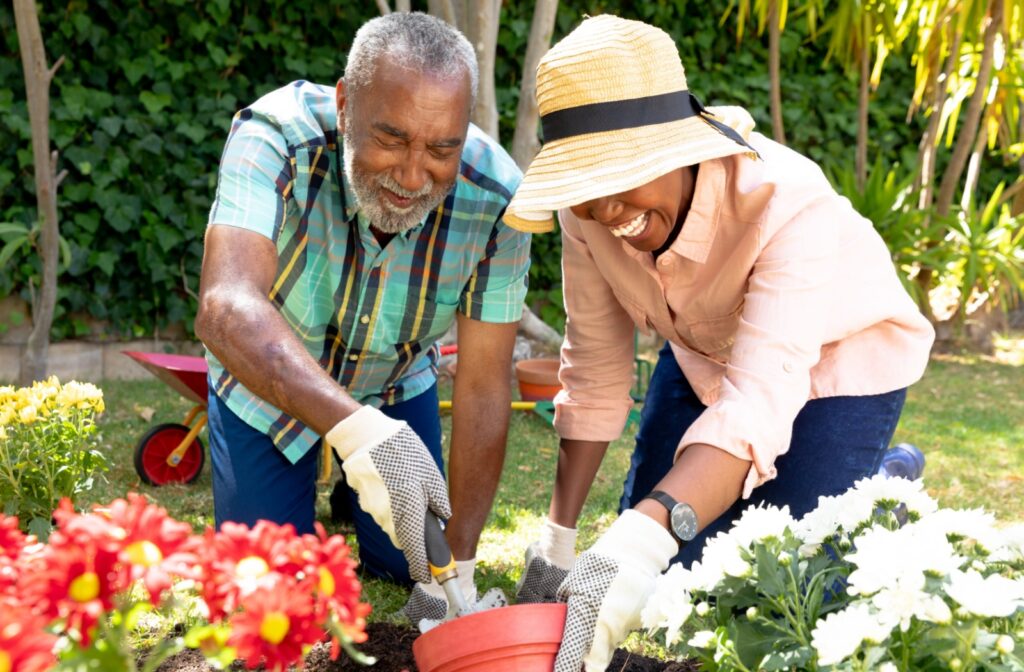Gardening has long been revered as a therapeutic activity and practice that nurtures both the plants and the individual. Benefits from gardening include physical exercise, psychological wellness, and cooperative social opportunities.
Senior living communities support older adults’ overall health and well-being with care, comfort, and various opportunities to explore new hobbies such as gardening and connecting with like-minded people.
Whether it’s visiting gardens or gardening, there are plenty of restorative benefits for seniors from being around plants. Incorporating these activities into daily life can have noticeable effects on their lives.
- Physical Health Benefits
Since gardening requires regular care, one of the most immediate benefits older adults can reap from gardening is a boost to their physical health. Simply planting, weeding, and watering are gentle yet effective ways to preserve and improve physical functioning, such as mobility, strength, and dexterity.
These activities engage multiple muscle groups, promoting physical activity while being easy on the joints. Increased physical activity from gardening can also prevent osteoporosis and reduce the risk of some cancers, type 2 diabetes, depression, and heart disease.
- Exposure to Vitamin D
Besides exposure to nature, gardening outdoors exposes older adults to vitamin D, aptly nicknamed the ‘sunshine vitamin’. Exposure to sunlight during gardening helps increase vitamin D levels and lower blood pressure. With precautionary measures such as sunscreen and proper hydration, that valuable time in the sun can be incredibly beneficial.
- Reduces Stress
There are multiple mental health benefits of gardening for older adults, including emotional regulation and enhanced well-being. Immersing oneself in the tranquility of nature can significantly lower stress levels and alleviate symptoms of depression and anxiety. The repetitive tasks involved in gardening can also serve as a form of meditation, helping to clear the mind and improve focus.
- Better Cognition
The cognitive benefits of engaging with plants, from nurturing, caring, and raising them, provide older adults with mental stimulation. Gardening groups that focus on learning about plants offer cognitive enhancements in older adults. The mental planning and problem-solving involved in maintaining a garden can keep the mind sharp, potentially staving off cognitive decline.
- Social Benefits
Gardening offers fertile ground for nurturing social connections, especially during challenging transitions like retirement. It presents older adults with opportunities to engage with family members and receive social support from the wider community, whether through gardening groups or clubs, sharing gardening tips, swapping seeds, or simply enjoying the beauty of their efforts with others.
Senior living communities with communal gardens provide a space for residents to collaborate, fostering a sense of belonging and purpose. These social interactions are crucial for emotional well-being and combating feelings of isolation.
- Nutritional Benefits
A garden can be a treasure trove of fresh, nutritious produce. Older adults who garden are more likely to incorporate fruits and vegetables into their diet, reaping the rewards of their labor with delicious and healthy meals. Growing one’s food can also instill a greater appreciation for healthy eating and sustainability.
- Boosts Immune System
Gardening outdoors offers the opportunity to breathe deeper. For older adults, this can help clear out the lungs, improve digestion and immune response, and increase oxygen levels in the blood. Other benefits include reduced heart rate and muscle tension.
Tips for Seniors to Start Gardening
Getting started with gardening can be as simple as planting herbs in a windowsill box or as ambitious as creating a backyard vegetable garden. Here are some tips for older adults when starting outdoor gardening:
- Start small and gradually increase the size of your garden as you become more comfortable with gardening.
- Consider using adaptive tools such as raised beds, long-handled tools, or kneeling pads for those with mobility issues, and to make gardening easier on the body.
- Choose low-maintenance plants that require less effort and care, such as succulents or herbs.
- Look into plants with therapeutic properties that have calming and stress-relieving properties.
- Don’t be afraid to ask for help from family, friends, or community members if needed.
- Take breaks and listen to your body. Gardening is supposed to be enjoyable and not cause strain or discomfort.
With these gardening tips in mind, older adults can embark on a fulfilling journey toward better physical, mental, and emotional well-being.
Stay Active, Grow, & Connect
The health benefits of gardening for older adults are as varied and vibrant as the gardens they cultivate. From fostering physical and mental wellness to encouraging nutritional choices and social interaction, gardening is a holistic activity that nurtures the body, mind, and spirit.
Whether you’re a seasoned green thumb or a budding gardener, there’s no time like the present to start gardening for a healthier, happier life. Contact The Legacy at Cimarron to learn how we support older adults with opportunities to connect and grow for overall health and well-being.


